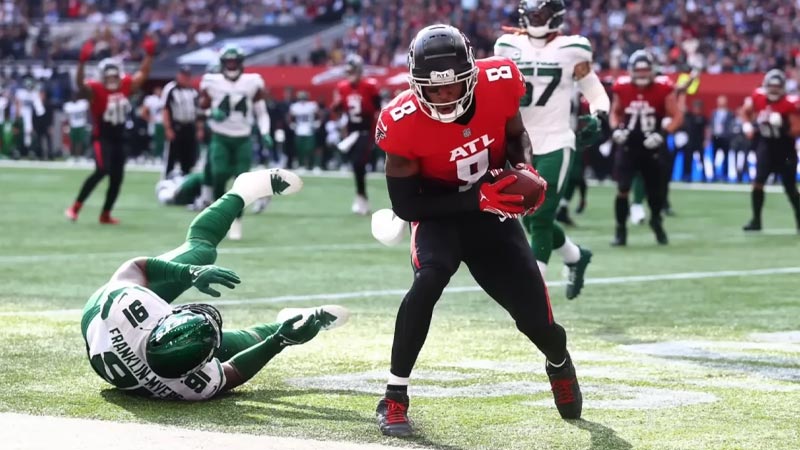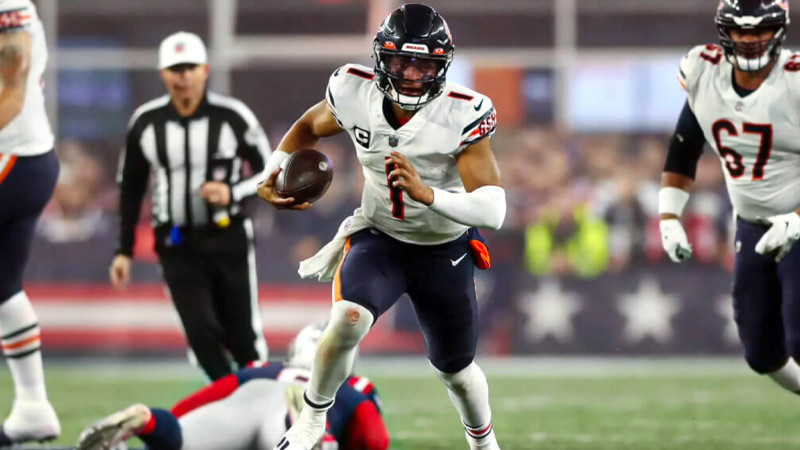In the realm of Fantasy American Football, the term “doubtful” carries significant weight, often triggering a cascade of strategic decisions for team managers. When a player’s status is labeled as “doubtful” on the injury report, it signifies a precarious situation.
This classification typically indicates that the player has a high likelihood of missing the upcoming game due to an injury or other factors, casting doubt on their availability.
Fantasy football managers must carefully weigh the risks and rewards of starting or benching a doubtful player, factoring in potential replacements and the player’s historical performance.
Successfully navigating this uncertainty is a crucial aspect of managing a competitive fantasy football team.
Meaning of Doubtful in Fantasy American Football
In Fantasy American Football, the term “doubtful” is a crucial designation found on injury reports that significantly influences roster decisions for team managers.
When a player is listed as “doubtful,” it implies that they are facing substantial uncertainty regarding their availability for the upcoming game.
Typically, this classification suggests that the player is dealing with a significant injury or ailment, making it highly unlikely that they will participate in the game.
Fantasy football managers must carefully consider the implications of a doubtful status when setting their lineups.
Starting a doubtful player can be risky, as they may be limited in their performance or not play at all, potentially leaving your team at a disadvantage.
On the other hand, benching a player who unexpectedly plays at a high level can be equally frustrating.
To make informed decisions, managers often monitor pre-game reports, consult injury experts, and evaluate the player’s history of dealing with injuries.
Successfully navigating the “doubtful” designation is a crucial aspect of managing a competitive fantasy football team and requires a keen understanding of both player health and strategic gameplay.
When a Player Defined as Doubtful in Fantasy American Football?

A player is defined as “doubtful” in Fantasy American Football primarily due to uncertainty surrounding their ability to participate in an upcoming game.
This designation typically arises from various factors, with injuries being the most common reason.
When a player is dealing with an injury, team medical staff and coaches assess their condition and likelihood of recovery in time for the game.
Here are some reasons why a player might be labeled as “doubtful” in fantasy football:
Injury Severity
When a player is labeled as “doubtful,” it typically signifies that they have suffered a substantial injury that raises serious concerns about their ability to take the field.
These injuries often involve fractures, torn ligaments (such as ACL or MCL tears), or severe muscle strains.
The severity of these injuries makes it highly improbable that the player will be physically capable of playing at their best or even playing at all in the upcoming game.
Recovery Timeline
The “doubtful” designation can also be tied to the player’s recovery timeline. Even if the injury isn’t extremely severe, if it’s expected to take longer to heal than the time available before the game, the player will be designated as doubtful.
For instance, if a player suffers a moderate ankle sprain but needs two weeks to recover, and the game is just days away, they may be listed as doubtful due to the limited time for recuperation.
Limited Practice Participation
Leading up to a game, teams hold practice sessions to prepare their players. When a player is unable to participate fully in these practices due to injury, it raises significant doubts about their readiness and ability to perform.
Limited practice participation suggests that the player may not have had sufficient on-field preparation, making them a risky start for fantasy managers.
Coach’s Discretion
In some cases, coaches use the “doubtful” status strategically. They may label a player as doubtful even if there’s a slim chance they could play.
This tactic is employed to keep their opponent guessing about the game plan. It’s a form of gamesmanship aimed at maintaining a competitive advantage.
Fantasy managers must be cautious when interpreting this designation, as it may not always reflect the player’s actual health status accurately.
Medical Evaluation
Team medical staff conduct comprehensive evaluations of the player’s injury. This includes analyzing medical imaging, such as MRI scans or X-rays, to assess the extent of the damage. The results of these evaluations significantly influence the player’s designation.
Game-Time Decision
In certain cases, a player’s status remains uncertain until just before the game. Coaches and medical staff may want to evaluate the player’s condition closer to kickoff.
Until a final decision is made, the player may retain a “doubtful” designation, adding to the suspense.
Player History
A player’s history of managing injuries can influence whether they are designated as “doubtful.” If a player has a track record of playing through injuries successfully, they may be less likely to receive this designation.
Conversely, if a player has a history of being cautious with injuries, they may be labeled as “doubtful” more frequently.
Other Terms and Their Meanings in Fantasy American Football

Fantasy American Football is filled with various terms and designations that can influence roster decisions and gameplay.
Here are some key terms and their meanings:
Questionable
This designation indicates that a player has a 50-50 chance of playing in the upcoming game. It implies uncertainty but leaves the possibility open for their participation.
Out
When a player is labeled as “out,” it means they will not play in the next game due to injury or other reasons.
Probable
While less commonly used in recent years, “probable” once indicated a high likelihood of a player suiting up for the game. However, this designation has been phased out in favor of “questionable” in many leagues.
Active
On game day, players who are “active” are eligible to play and are part of the team’s lineup for that game.
Inactive: “Inactive” players are not eligible to participate in the game on that day. This designation is often used for injured players or those not included in the game plan.
Waiver Wire
The waiver wire is a pool of available players not on any team’s roster. Managers can add or drop players from the waiver wire based on their waiver priority.
Trade
Managers can exchange players with one another, often to improve their team’s overall performance. Trades can involve players, draft picks, or a combination of both.
Start/Sit
Refers to the decision of whether to start (play) or sit (bench) a player in a given week’s lineup based on their performance expectations and matchups.
Fantasy Points
The numerical value assigned to a player’s performance in a given game, is calculated based on their on-field statistics such as touchdowns, yards gained, and receptions.
Flex Position
A roster spot allows a manager to start a player from different positions (e.g., running back, wide receiver, or tight end) depending on their strategy and available players.
Bye Week
The week during the regular NFL season when a team has a bye and does not play. Fantasy managers must bench or replace players from teams on a bye.
PPR (Points Per Reception)
A scoring format that rewards players with fantasy points for each reception they make, often favoring wide receivers and pass-catching running backs.
IDP (Individual Defensive Player)
Some fantasy leagues include defensive players, such as linebackers or defensive backs, in addition to offensive players, allowing managers to score based on defensive statistics.
Streaming
A strategy where fantasy managers pick up and start players on a weekly basis based on favorable matchups rather than relying on a consistent roster.
Injured Reserve (IR)
A roster spot that allows managers to place injured players who are ruled out for a significant period, freeing up a regular roster spot for an active player.
Doubtful vs Questionable in Fantasy American Football

“Doubtful” and “Questionable” are two common designations used in Fantasy American Football to describe the likelihood of a player’s availability for an upcoming game.
These terms help fantasy managers make informed decisions when setting their lineups.
Here’s a comparison of the two:
| Aspect | Doubtful | Questionable |
| Meaning | Highly unlikely to play; significant doubts | Uncertain, 50-50 chance of playing; unclear status |
| Injury Severity | Often indicates a more severe injury | Typically suggests a less severe or minor injury |
| Practice Participation | Limited or no practice participation | May have participated in practice sessions |
| Risk for Fantasy Managers | High risk to start; likely to sit out | Moderate risk; decision often depends on game-time updates |
| Strategic Implications | Usually a clear signal to the bench | Requires monitoring of pre-game reports and updates |
| Coaches’ Use | Coaches tend to be conservative; players unlikely to play | Coaches might employ gamesmanship; players may have a chance to play |
| Decision Making | Managers should strongly consider benching | Managers can weigh options based on game-time information |
FAQS
Is “doubtful” the same as “out” in fantasy football?
No, “doubtful” and “out” are different designations. “Doubtful” suggests a high likelihood of not playing, but there’s still a small chance the player might participate.
“Out” indicates that the player is confirmed to be unavailable for the upcoming game.
Can a player listed as “doubtful” suddenly play in the game?
While it’s rare, it is possible for a player labeled as “doubtful” to play in the game, especially if they show significant improvement closer to the game day. However, this is an exception rather than the norm.
How should I handle a player listed as “doubtful” in my fantasy lineup?
It’s generally advisable to bench a player listed as “doubtful” in your fantasy lineup.
The risk of them not playing or performing poorly due to injury outweighs the potential reward.
Do “doubtful” designations apply only to injured players?
While “doubtful” designations are most commonly associated with injured players, they can also be used for players facing other uncertainties that might impact their availability, such as personal matters or disciplinary issues.
To Recap
In Fantasy American Football, the term “doubtful” holds substantial significance, serving as a critical indicator of player availability.
This designation emerges from a complex interplay of injury severity, recovery timelines, practice participation, medical evaluations, coaching strategies, and player histories.
When a player is deemed “doubtful,” it signifies a high level of uncertainty regarding their ability to take the field. Fantasy football managers must carefully weigh the risks and rewards associated with starting or benching such players.
Successfully navigating this uncertainty is not merely a strategic challenge but a testament to the intricate nature of the sport, where injuries can shape the fate of fantasy football rosters.







